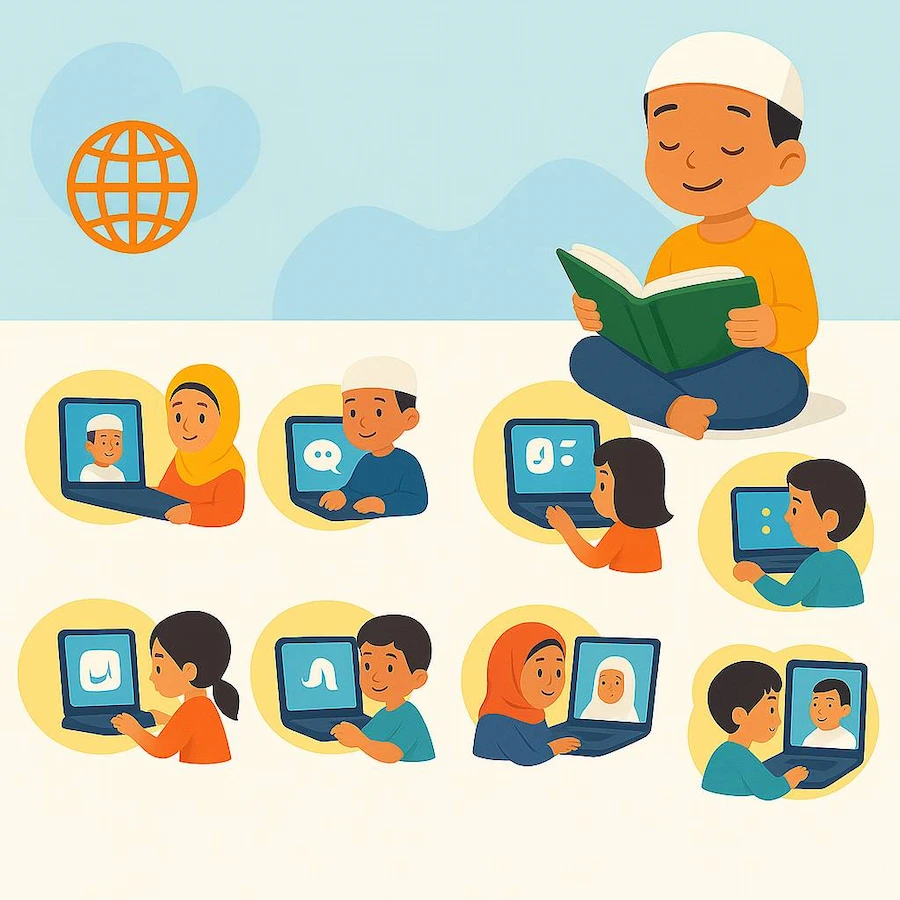Table of Contents
Teaching the Quran to children is a sacred responsibility and a beautiful opportunity to nurture faith, character, and a lifelong love for Islam. In today’s digital age, online interactive platforms have revolutionized Quranic education, making learning more engaging, accessible, and fun for kids worldwide. Whether your child is just starting to recognize Arabic letters or ready to master Tajweed, the right online tools can transform their Quranic journey into an adventure filled with excitement and meaning.
This guide explores 10 creative and effective ways to teach Quran to kids using online interactive platforms, drawing on the latest educational research, expert recommendations, and real-world success stories. Discover how you can inspire your child to connect deeply with the Quran-while making every lesson enjoyable and memorable.
Why Choose Online Interactive Platforms for Quran Learning?
Online Quran learning platforms have become the preferred choice for many Muslim families due to their:
- Flexibility: Kids can learn at their own pace and schedule, fitting lessons around school and family life.
- Qualified Teachers: Access to certified, experienced tutors from around the world.
- Engaging Content: Use of games, stories, multimedia, and interactive activities to keep kids motivated.
- Personalized Learning: Lessons tailored to each child’s age, level, and interests.
- Safe Environment: Learning from home in a secure, supportive setting.
These platforms combine traditional Islamic values with modern teaching methods, ensuring children not only recite the Quran correctly but also understand its teachings and develop a strong spiritual foundation.

You can also view: Learn Quran Reading Basics
1. Gamified Quran Learning Apps
Gamification turns Quran study into a playful experience, motivating kids through rewards, levels, and challenges.
- Platforms like Quran Era use animated characters, story-based lessons, and visual mnemonics to teach Arabic letters and Tajweed rules in a fun, memorable way.
- Kids earn points, badges, and certificates as they progress, which boosts engagement and confidence.
Benefits:
- Makes learning enjoyable and less intimidating.
- Encourages regular practice through positive reinforcement.
- Helps children retain information longer.
Tip: Look for apps that align with authentic Islamic teachings and offer parental controls.
2. Interactive Live Classes with Certified Tutors
Live online classes connect kids with expert Quran teachers who specialize in child-friendly instruction.
- Platforms such as Top Quran Classes and TarteeleQuran offer one-on-one or small group sessions, ensuring personalized attention and immediate feedback.
- Teachers use interactive whiteboards, quizzes, and real-time correction to make lessons dynamic.
Benefits:
- Builds a strong student-teacher relationship.
- Allows for tailored lessons based on each child’s strengths and challenges.
- Supports proper pronunciation and Tajweed from the start.
Tip: Choose platforms that offer trial classes so you can find the best teacher for your child’s learning style.
3. Storytelling and Animated Videos
Children love stories-and the Quran is full of inspiring narratives.
- Platforms like Noor Academy use animated videos featuring relatable characters (e.g., Noor and Nora) to teach Quranic stories, morals, and lessons.
- Storytelling helps kids understand the context and meaning behind verses, making the Quran come alive.
Benefits:
- Enhances comprehension and emotional connection.
- Makes abstract concepts concrete and relatable.
- Sparks curiosity and discussion.
Tip: Supplement lessons with age-appropriate Islamic storybooks and encourage kids to retell stories in their own words.
4. Visual Aids and Flashcards
Visual learning tools are especially effective for young children.
- Use digital flashcards, posters, and charts to teach Arabic letters, Quranic vocabulary, and Tajweed rules.
- Many platforms offer downloadable resources and interactive games to reinforce visual memory.
Benefits:
- Supports different learning styles (visual, auditory, kinesthetic).
- Makes complex concepts easier to grasp.
- Encourages independent study and review.
Tip: Create a dedicated learning space at home with printed visuals and encourage kids to decorate it with their favorite Quranic themes.

You can also view: Online Quran Teachers
5. Quran Memorization Games
Memorizing Quranic verses (Hifz) can be challenging-but games make it fun!
- Online platforms use memory matching games, fill-in-the-blank activities, and timed challenges to help kids memorize Surahs and Ayat.
- Progress tracking and rewards motivate kids to set and achieve goals.
Benefits:
- Builds confidence and a sense of accomplishment.
- Reinforces long-term retention.
- Makes repetition enjoyable rather than tedious.
Tip: Celebrate milestones with small rewards or certificates to keep motivation high.
6. Collaborative Group Learning
Learning with peers fosters a sense of community and healthy competition.
- Many platforms offer group classes, discussion forums, and collaborative projects where kids can learn together, share insights, and help each other.
- Group activities include Quran recitation circles, team quizzes, and joint storytelling sessions.
Benefits:
- Develops social skills and teamwork.
- Encourages kids to learn from each other.
- Makes Quran study a shared family or community experience.
Tip: Organize virtual Quran study groups with friends or relatives for added support and fun.
7. Interactive Whiteboards and Drawing Tools
Drawing and writing help kids internalize what they learn.
- Teachers use interactive whiteboards to illustrate Tajweed rules, write out verses, and engage kids in hands-on activities during live sessions.
- Kids can draw Arabic letters, annotate verses, and create their own Quranic art projects.
Benefits:
- Enhances creativity and fine motor skills.
- Makes abstract rules tangible.
- Encourages active participation.
Tip: Encourage kids to keep a Quran learning journal or scrapbook to track their progress and reflections.
8. Personalized Learning Paths and Progress Tracking
Every child learns differently-personalized platforms adapt to individual needs.
- Platforms like Top Quran Classes offer customized lesson plans, progress reports, and adaptive quizzes based on each child’s level and pace.
- Parents can monitor achievements and areas needing improvement.
Benefits:
- Ensures no child is left behind or bored.
- Builds self-esteem by recognizing growth.
- Helps parents stay involved in their child’s Quranic journey.
Tip: Set realistic goals and celebrate every step forward, no matter how small.
9. Parent-Child Interactive Activities
Parents play a crucial role in Quranic education.
- Online platforms provide parent guides, activity sheets, and tips for reinforcing lessons at home.
- Activities include joint recitation, Quranic crafts, and family quizzes.
Benefits:
- Strengthens family bonds and Islamic identity.
- Models lifelong learning and devotion.
- Makes Quran study a cherished family tradition.
Tip: Dedicate a regular “Quran time” each week for family learning and reflection.

10. Certificates, Rewards, and Recognition
Kids thrive on encouragement and recognition.
- Many platforms award certificates, badges, and digital trophies for completing courses, memorizing Surahs, or mastering Tajweed.
- Recognition motivates kids to set higher goals and take pride in their achievements.
Benefits:
- Builds a sense of accomplishment and purpose.
- Encourages perseverance and discipline.
- Makes Quran learning a positive, celebrated experience.
Tip: Display certificates and awards in your child’s room or learning space as a reminder of their progress.
You can also view: Learn Quran Online: Lessons for Children
Common Questions from Parents
Q: What age should my child start learning Quran online?
A: Most platforms recommend starting as early as age 4 or 5, when children can recognize letters and follow simple instructions.
Q: How do I choose the best online Quran platform for my child?
A: Look for platforms with certified teachers, engaging content, flexible scheduling, and positive reviews from other parents. Trial classes are a great way to assess fit.
Q: Can online Quran classes help with memorization (Hifz)?
A: Yes! Many platforms offer specialized Hifz programs with interactive memorization games, progress tracking, and expert guidance.
Q: Is online learning as effective as in-person classes?
A: Research and parent feedback show that online interactive platforms can be equally effective, especially when lessons are personalized and engaging.
Take the Next Step: Empower Your Child’s Quranic Journey
Online interactive platforms have made Quran learning more accessible, engaging, and effective than ever before. By combining expert instruction, creative activities, and personalized support, you can help your child build a strong foundation in faith and knowledge-while making every lesson a joyful experience.
Ready to start? Explore the Top Quran Classes for Kids to find certified tutors, engaging courses, and flexible schedules tailored to your family’s needs.
Invest in your child’s spiritual growth today-and watch them flourish as confident, knowledgeable, and devoted young Muslims.
Keywords used naturally throughout:
- Online Quran classes for kids
- Interactive Quran learning platforms
- Fun ways to teach Quran
- Quran memorization games
- Gamified Quran apps
- Certified Quran tutors
- Tajweed for kids
- Quran storytelling
- Visual Quran aids
- Personalized Quran lessons
- Quran rewards and certificates
Explore Online Quran Classes for Kids for more details on programs, tutors, and trial lesson

